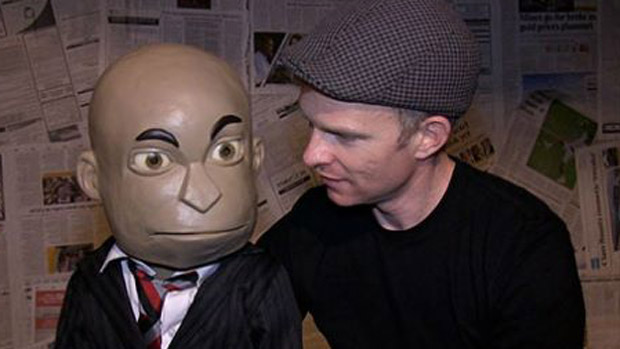South African court gags ventriloquist and dummy
Court bans satirist and his puppet from criticising South African singer Steve Hofmeyr for 'racism'

A free daily email with the biggest news stories of the day – and the best features from TheWeek.com
You are now subscribed
Your newsletter sign-up was successful
A court in South Africa has intervened to bring an end to a row between Afrikaans pop singer Steve Hofmeyr and a ventriloquist's dummy.
Hofmeyr obtained a court order banning comedian Conrad Koch and his puppet, Chester Missing, from criticising him on social media, Al Jazeera reports.
The order was issued after a row broke out on Twitter between Hofmeyr and the puppet over the singer’s comments about post-1994 South Africa, Eyewitness News said.
The Week
Escape your echo chamber. Get the facts behind the news, plus analysis from multiple perspectives.

Sign up for The Week's Free Newsletters
From our morning news briefing to a weekly Good News Newsletter, get the best of The Week delivered directly to your inbox.
From our morning news briefing to a weekly Good News Newsletter, get the best of The Week delivered directly to your inbox.
The argument began when Hofmeyr tweeted to his 121,000 followers that the ruling African National Congress was prejudiced towards white South Africans.
Sorry to offend but in my books Blacks were the architects of Apartheid. Go figure.— Steve Hofmeyr (@steve_hofmeyr) October 23, 2014
In response, Chester Missing's Twitter account accused the singer of being racist. “It‘s like we are dealing with the racist version of Lord Voldemort from Harry Potter here: he who shall not be named”, a tweet from the puppet's twitter account said.
Koch, the ventriloquist behind Chester Missing, denied that his tweets could be considered hate speech. “[I] will be opposing them strongly, very strongly”, he said.
The comedian has also started a campaign calling on companies to end their contracts with Hofmeyr and urging South Africans to boycott any brands associated with him, Al Jazeera reports.
A free daily email with the biggest news stories of the day – and the best features from TheWeek.com
Koch, famous for making political statements about race and culture, said that the court order has impacted on his act. “It’s important that we talk about white privilege and apartheid, satire around politics, social identity and the nature of our economic system”, he said.
-
 6 exquisite homes with vast acreage
6 exquisite homes with vast acreageFeature Featuring an off-the-grid contemporary home in New Mexico and lakefront farmhouse in Massachusetts
-
 Film reviews: ‘Wuthering Heights,’ ‘Good Luck, Have Fun, Don’t Die,’ and ‘Sirat’
Film reviews: ‘Wuthering Heights,’ ‘Good Luck, Have Fun, Don’t Die,’ and ‘Sirat’Feature An inconvenient love torments a would-be couple, a gonzo time traveler seeks to save humanity from AI, and a father’s desperate search goes deeply sideways
-
 Political cartoons for February 16
Political cartoons for February 16Cartoons Monday’s political cartoons include President's Day, a valentine from the Epstein files, and more
-
 Epstein files topple law CEO, roil UK government
Epstein files topple law CEO, roil UK governmentSpeed Read Peter Mandelson, Britain’s former ambassador to the US, is caught up in the scandal
-
 Iran and US prepare to meet after skirmishes
Iran and US prepare to meet after skirmishesSpeed Read The incident comes amid heightened tensions in the Middle East
-
 Israel retrieves final hostage’s body from Gaza
Israel retrieves final hostage’s body from GazaSpeed Read The 24-year-old police officer was killed during the initial Hamas attack
-
 China’s Xi targets top general in growing purge
China’s Xi targets top general in growing purgeSpeed Read Zhang Youxia is being investigated over ‘grave violations’ of the law
-
 Panama and Canada are negotiating over a crucial copper mine
Panama and Canada are negotiating over a crucial copper mineIn the Spotlight Panama is set to make a final decision on the mine this summer
-
 Why Greenland’s natural resources are nearly impossible to mine
Why Greenland’s natural resources are nearly impossible to mineThe Explainer The country’s natural landscape makes the task extremely difficult
-
 Iran cuts internet as protests escalate
Iran cuts internet as protests escalateSpeed Reada Government buildings across the country have been set on fire
-
 US nabs ‘shadow’ tanker claimed by Russia
US nabs ‘shadow’ tanker claimed by RussiaSpeed Read The ship was one of two vessels seized by the US military